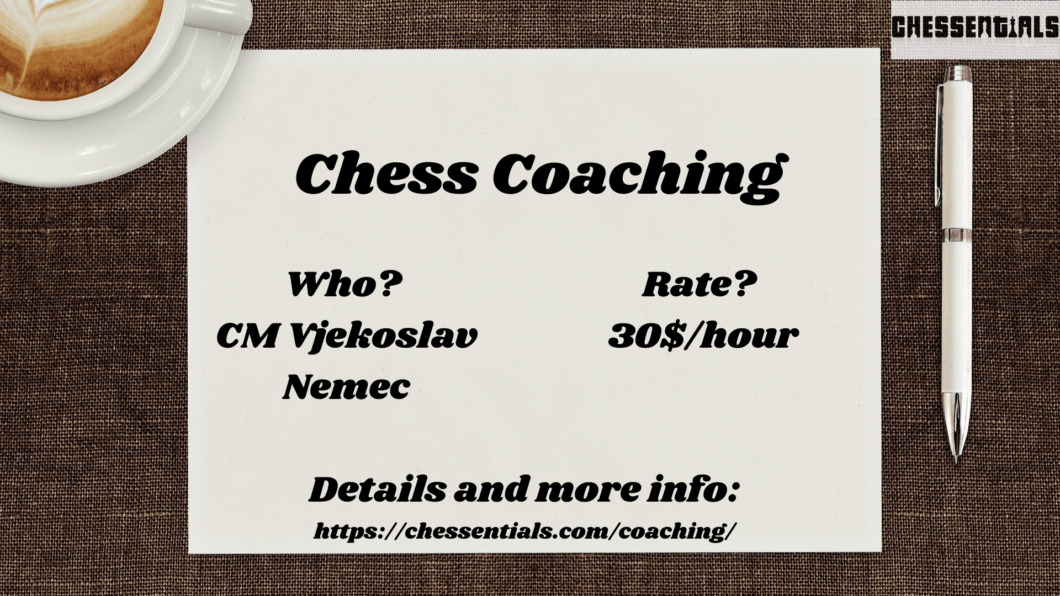Chess coaching?
I offer individual and group chess lessons for players up to 2000/2100 ELO (FIDE).
The price?
The price is 30$/hour.
Software?
I use Skype/Zoom/discord video call option and Lichess Studies
What is your approach to coaching?
My chess (and life) philosophy revolves around the concept of deliberate practice and active learning. Many people hire a chess coach and expect him to do the work instead of them.
I think this is the wrong approach to chess improvement. I think the role of a good coach is to detect the areas in which the student lacks, guide him and help him improve his understanding, supplement appropriate material and hold him accountable – with empathy and psychological support. I think the coach should both motivate and be honest.
I believe the coach’s role is to improve one’s CHESS THINKING (instead of memorization) and to teach the student how to study chess effectively (this might seem like a simple task, but many people seem to be struggling in this regard).
Also, if after the lesson I haven’t managed to increase your love for the game by sharing my enthusiasm, I will consider it a failure.
What sets you apart from other coaches?
I think it is a difficult, ungrateful and pompous question to answer.
I hope my advantage might be that I have started playing serious chess relatively late in my life (20 years of age). I know how difficult it is to start improving as an adult and completely on your own. I know how difficult it is to develop healthy chess habits (chess training routine).
More importantly, I also know how confusing it is to determine the best source for improving your game between the hyperinflation of chess material and content being offered to us on a daily basis. I have read my fair share of chess books and bought things from several chess websites, so I have some knowledge of what resources we chess players have when it comes to improving our game.
How do the lessons look like?
Before the lessons start, I’d like you to send me some of your games so I can analyze them and assess your play. Also, it would be nice if we could talk about your goals and ambitions and how much time you have to study chess in general.
During the lessons I/we will:
- Analyze your games with particular emphasis on mistakes and critical moments
- Study middlegame plans and ideas with an emphasis on how to handle different pawn structures and how to select a plan
- Study typical endgames and learn how to play and think in the endgame
- Try to pose good questions and answer them to the best of our ability – I try to make the lessons interactive and ask the student a lot so he also uses his brain
- Develop concrete training plan based on the weaknesses in your play and your preferences
During the lessons I will not:
- Simply give a set of tactical puzzles while I yawn and collect my money
- Go over the opening lines in great depth. I don’t think memorizing openings is the best approach to studying chess in general – and especially during chess lessons. Of course, if a student has questions about a certain line (or anything else) I will try to answer to the best of my ability. But it will almost never be initiated from my end.
After the lesson, I will provide the material we studied in .pgn format with comments (or in PDF, if preferred). I will also provide additional material and assign the homework. I also GIVE FEEDBACK ON THE HOMEWORK when you solve it throughout the week (outside of the lesson itself – for NO ADDITIONAL FEE). Finally, I will suggest the literature/references/resources for individual study.
Of course, since I try to not take myself too seriously, I might irritate the student with my humor attempts. But hopefully, it will help to add the fun and relaxed component to the lessons. And of course – I will try to be serious when I need to be.
Sample lesson
You can see how a typical lesson with me looks like in the following video:
Contact?

